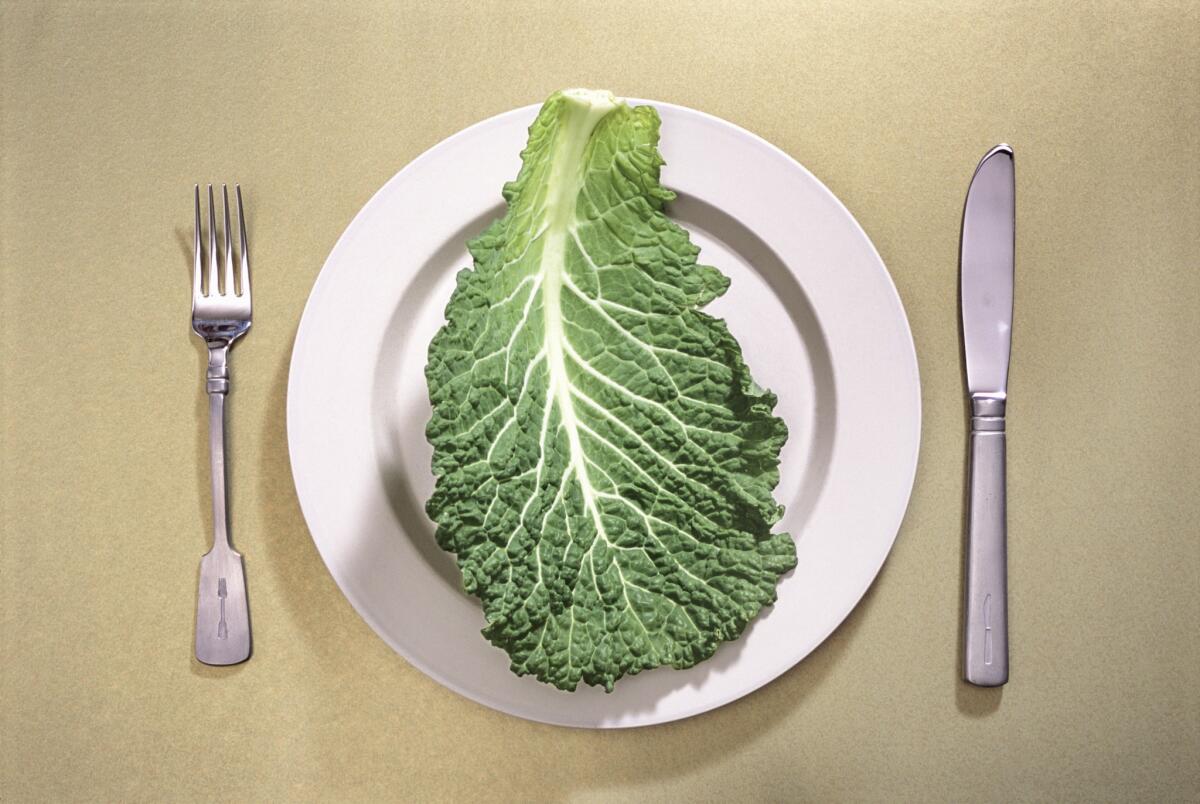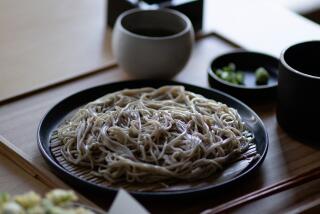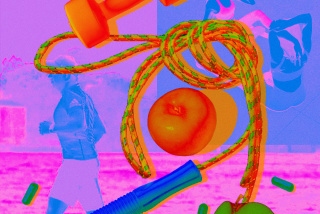Op-Ed: Paleo, vegan, gluten-free -- the only certainty about health trends is their reversal

During my last visit to Los Angeles, in March, I chronicled my meals by the dietary restrictions of my dining companions. For breakfast one day, I ate in Los Feliz with four friends who were varying degrees of gluten-free. One had suddenly discovered a gluten intolerance, while another felt it would be better for her pregnancy. I ordered ricotta pancakes — and enjoyed each glutinous bite.
Another day, I met my friend Marko for lunch in Venice, where he shunned the artisan toast with house ricotta because he was on the paleo diet. Although no refined grains, sugar or dairy could enter his body, he regularly ate lamb chops for breakfast. Still, he told me as he dug into a piece of fish and a salad, he could now run faster, catch more waves and make better love. I congratulated him — and ordered a lemon poppy seed muffin for the road.
During dinner at an Indian restaurant downtown, my friend Christopher, once a die-hard fan of Langer’s pastrami, waved away anything with meat in it, because he wasn’t sure of the chicken vindaloo’s provenance and couldn’t risk eating something from a factory farm. “Do you want me to ask the waiter where the meat’s from?” I asked, with genuine concern. No, Chris said, he didn’t want to be difficult.
There are few cities that can compete with Los Angeles for the sheer energy its residents pour into health and diet trends. This town is the world leader in anxiety over what you should, and shouldn’t, be eating. That’s not necessarily a good thing. Having spent the last few years studying the evolution of various food trends, it’s become clear no food trend is more powerful, and potentially dangerous, than one that targets health and diet.
Health trends are not new. Ever since humans have had enough to eat, we have worried about the right things to eat and devised diets to target various goals, including weight loss, beauty, sexual health and disease prevention. Nearly every consumable food and beverage, whether organ meats, tomatoes and grain liquor or sugary sodas have been praised, at one point, as a panacea.
But as much as our knowledge about health and nutrition has evolved, we still know remarkably little about how our food affects our bodies, and this injects the whole question of diet with a tremendous dose of anxiety. Although my friend’s 91-year-old grandmother in Buenos Aires happily consumes only steak, bread and potatoes (as she’s done for 70-plus years), we in North America are tearing our hair out trying to remember whether it was margarine or butter that would kill us this week.
When you look at health trends over the long term, the only certainty is their inevitable reversal. The fat-free diet of the 1980s and ‘90s, hailed at the time as the definitive guide for how we should eat, is now being thoroughly debunked. Think of all the money and meals you wasted on fat-free ice cream and bone-dry chicken breasts that didn’t do you a lick of good. The same goes for our obsession with high-fiber eating, which promised to prevent heart attacks and cancer but only truly benefited the toilet paper industry.
It is this lack of clarity and understanding that make health and diet trends so dangerous. We all want to feel better and live longer, but with so much conflicting information and noise, we open ourselves up to misinformation. A recent skit on the “Jimmy Kimmel Live” show, in which random Angelenos who were on gluten-free diets were asked to define what gluten actually was, was tragicomic — most had no idea. We too readily make radical changes to our bodies without really knowing why.
With the exception of the long-held mantra to eat a balanced diet, steer clear of processed food and maybe ease up on the doughnuts, most health and diet trends are little more than a grain of science with a heady dose of marketing. The term “superfoods,” bandied about so readily by everyone, including Dr. Oz and Starbucks, is a word so deceptively meaningless that the European Union practically banned its use.
Health food trends continue to grow because they are a cash cow. It’s estimated that the global antioxidant market will generate nearly $100 billion in a few years, even though most of us have no idea what an antioxidant is, and their long-term benefits are far from certain. But that doesn’t stop the California Walnut Board, the pomegranate hucksters at POM and assorted vendors of sugar drinks (from Vitamin Water to 7-Up) from proudly slapping “antioxidant” on their packaging and ads, while subtly pushing the narrative that it might possibly be the cure for cancer.
On my last night in Los Angeles, my wife and I offered to cook dinner for our friend Josh, whom we were staying with. “That would be wonderful,” he said, but the meal could have no meat, dairy, eggs, white grains, sugar or salt. “Fish is great, though,” he added, as though we had another option. There was no dessert.
David Sax is a journalist and the author of, most recently, “The Tastemakers: Why We’re Crazy for Cupcakes but Fed Up with Fondue.”
More to Read
A cure for the common opinion
Get thought-provoking perspectives with our weekly newsletter.
You may occasionally receive promotional content from the Los Angeles Times.






